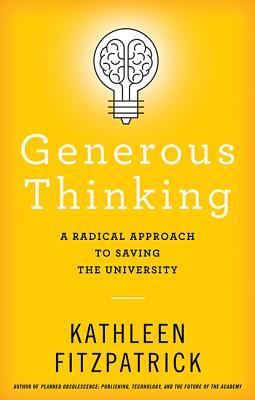I chose to read this book as part of a project for my HIED 801: College and University Leadership course. I wasn't sure if I would enjoy this book because sometimes I'm a fan of "radical approaches" and sometimes they scare me to death. But, I was pleasantly surprised with this book. Kathleen Fitzpatrick made me think deeply about higher education reform in a way that very few higher education books ever have.
In the Introduction, Fitzpatrick breaks down some issues with the competitive nature of higher education, both within and outside of the institutions. She promotes "generous thinking" as a way to collaborate rather than compete with the general public and with each other, both on an institutional and individual level. She acknowledges that this requires a complete rethinking of how higher education operates and interacts with people, and she promises to take us through how that rethinking might occur.
Chapter 1, On Generosity, is all about how education can be generous through our acts, our values, our feelings, and our practices. Fitzpatrick spends quite a bit of time at the end of the chapter discussing the importance of listening. She argues that we don't listen enough in higher education (true) and encourages us to rethink why that is and how to be better listeners to each other and to the public.
In Chapter 2 (by far my favorite), Fitzpatrick dissects the processes and practices of reading within the academy and within the public. She argues that higher education has long used reading to create divides and discusses how we can instead use it to create community and collaboration. As an English teacher turned higher education professional, this chapter was like a song to me. Fitzpatrick's use of reading as an allegory for higher education's relationship with the public is nothing short of genius in my opinion, and she executes it wonderfully accessible way.
Chapter 3 delves into working within and among the public. Fitzpatrick talks a lot about open access journals and how to engage the public in the work of the academy. When she talks about engagement, she's referring to deep, relational, consistent, and purposeful engagement. She is not referring to short-term partnerships or an exchange of money or services. This was the chapter where I really started to think. Fitzpatrick starts to get practical in this chapter, and some of her proposals completely buck traditional norms in higher education - which, for the record, I am completely on board with.
The practicality continues in Chapter 4, when Fitzpatrick digs deeply into the paradigm shifts that must occur within the university in order to make these changes and shift toward generosity and empathy rather than privatization and competition. She is not afraid to think big and push the envelope, which I appreciated and enjoyed. I found myself shaking my head during this chapter quite a bit.
Fitzpatrick concludes with a call to action - to engage in conversation around these issues, not to be afraid to think big, to collaborate with our community members, and to work for the good of the public. I thoroughly enjoyed this book and highly recommend it to everyone who works in higher education in any form, anyone who lives in or near a town with a university, and really anyone who cares about education in the United States at all.

